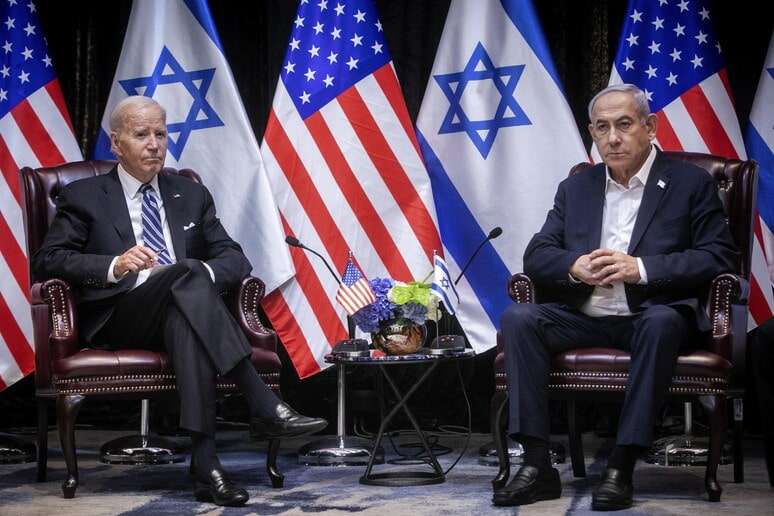While the U.S. has shown unwavering military support for Israel, notably in recent tensions involving Hamas and potentially Hezbollah, questions arise about the extent of American intervention in the region, especially given its complex history in the Middle East.

In light of recent attacks on Israel by Hamas, President Biden has firmly expressed the U.S. stance: “The United States has Israel’s back.” The President’s stern warning, seemingly directed at Iran and its associates, comes amidst increased tensions in the region.
Recent events have seen U.S. troops in Iraq and Syria targeted and a U.S. destroyer in the Red Sea intercepting missiles believed to be aimed at Israel. Additionally, the U.S. has augmented its military presence in the Eastern Mediterranean with a carrier strike group, soon to be accompanied by another. These carriers bring significant firepower, each hosting over 70 aircraft. Furthermore, President Biden has prepared thousands of U.S. troops to be deployed if necessary.
The bond between the U.S. and Israel is evident in their military alliance, with the U.S. supplying Israel approximately $3.8 billion annually in defense aid. This support is apparent in the American-made Israeli jets and precision munitions currently in use. In a recent move, President Biden sought Congress’s approval for a $105 billion military aid package, of which $14 billion would be designated for Israel.
Following this, the Pentagon unveiled plans to dispatch two advanced missile defense systems to the Middle East: a Terminal High Altitude Area Defense (THAAD) battery and extra Patriot batteries.
While the U.S.’s military backing is clear, its willingness to engage in another Middle Eastern conflict, especially during an election year, is questionable. Previous interventions have been politically, economically, and humanely expensive. Michael Oren, ex-U.S. Israeli ambassador, opines that the movement of U.S. aircraft carriers in the vicinity signals a readiness to use force if needed. However, Seth G. Jones, a security expert, believes direct military engagement, especially in Gaza, would be a last resort for the U.S.
A pressing concern for both nations is Hezbollah, a militant group backed by Iran and considered more potent than Hamas. With a substantial arsenal of rockets superior to Hamas’s and previous confrontations with Israel, the potential for Hezbollah’s involvement cannot be overlooked. Oren suggests that a scenario might arise where the U.S. deploys its significant airpower against targets within Lebanon, though ground troops seem unlikely.
Both Secretary of State Antony Blinken and Defence Secretary Lloyd Austin emphasize that the U.S. would act decisively if its military personnel or assets are threatened. While the U.S.’s resolve is clear, it also appears conditional. President Biden, during his recent visit to Israel, indicated that the U.S. expects Israel to permit humanitarian aid into Gaza and refrain from a prolonged occupation.
As the situation unfolds, some analysts, like Yaacov Katz from the Jerusalem Post, speculate that American support might wane if Israel’s operations in Gaza result in high civilian casualties.
Historically, direct U.S. intervention on Israel’s behalf has been rare. Notably, the U.S.’s deployment of Patriot batteries to shield Israel from Iraqi Scud missiles during the 1991 Gulf war stands out as an exception. Often, the U.S. has used its influence to restrain Israel’s actions in the region.
(Associated Medias | FAD) – All rights reserved.
